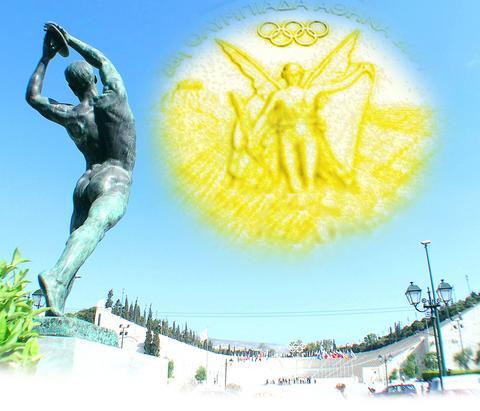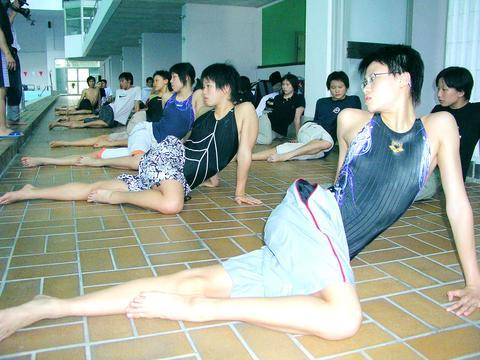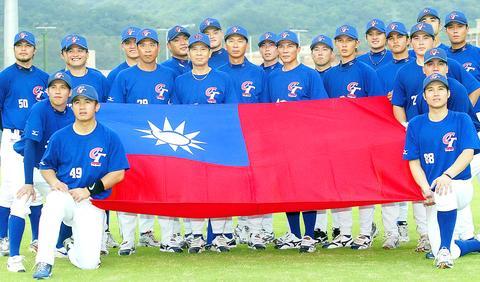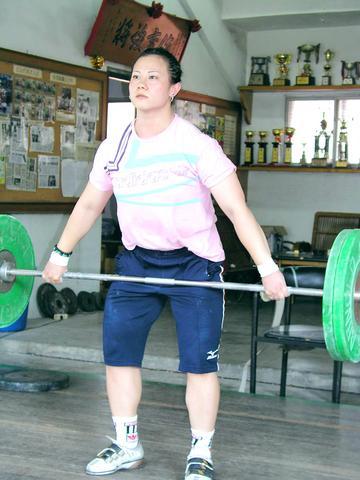As the clock ticks down to the opening of the Athens 2004 Olympic Games on Aug. 13, anticipation will be rising for the home team to pull off something that no Taiwanese athlete has managed before, namely bring home a gold medal.
There have been plenty of medals in the past -- silvers in weightlifting and taekwondo in Sydney and a silver in table tennis in Atlanta, to list a few -- but gold has remained out of reach throughout Taiwan's Olympic history and this year, it's hoped, will be the year to rectify the situation.
"There's no reason a Taiwanese athlete can't get a gold medal. We have great athletes, but it really boils down to their performance on the day of competition," said Steven Chen (陳士魁), deputy secretary general of the Chinese Taipei Olympic Committee.

PHOTO: TAIPEI TIMES
It might help this year that an unprecedentedly large team will be representing Taiwan at the Games, with 88 athletes competing in 14 events.
Part of the reason this year's Olympic team is so large is the inclusion of the baseball and softball teams, which between them account for 39 of the athletes and who carry on their shoulders much of Taiwan's high hopes for glory. Taiwan's baseball and softball teams are among the world's best, but when up against Cuba, the US, Japan and other powerhouses it's anyone's guess before the Games as to who will walk away the victors, Chen said.
As a measure of how important the baseball team is to this year's mission for gold, three of its players will carry the Chinese Taipei Olympic Committee flag onto the field at the opening ceremony leading the team, after Tajikistan's team and before Tanzania's. An agreement between the ROC government and the International Olympic Committee signed in 1981 stipulated that Taiwan would participate under the title Chinese Taipei, but that in the opening ceremony the team would appear in Taiwan's alphabetical position. Local spellings of country's titles are used to determine the alphabetical lineup of national teams.

PHOTO: TAIPEI TIMES
But baseball and softball are not the only events where Taiwan has high expectations of a strong finish. The other strong hopes for gold this year are in Taekwondo, weightlifting, archery and shooting.
Chu Mu-yen (朱木炎), an internationally top-ranked taekwondo athlete stands a good chance, as does Huang Shih-chun (黃世均) in the ladies weightlifting.
In other major events, however, like the track- and-field competitions, Taiwan won't even be sending competitors.

PHOTO: TAIPEI TIMES
"There isn't enough training for running and the other popular events, so there just aren't any good athletes in those categories," Chen said.
He cited the lack of appropriate locations to train athletes in endurance events, saying Taiwan's current Olympic training ground in Tsuoying, Kaohsiung County, will perhaps be supplemented in the future by a high-altitude training site and a seaside one to provide more targeted fitness regimens for specific events.
China's Olympic track-and-field and endurance sport athletes, for example, train at over 2,600m on the Tibetan plateau, which gives them a significant advantage when competing at sea-level stadia in Athens.

PHOTO: TAIPEI TIMES
But even if Taiwan's training facilities aren't ideal, Chen insists that this time the country's athletes won't be turning to performance-enhancing substances to compensate for any shortcomings, unlike at Sydney where one of Chinese Taipei's weightlifters gained the dubious distinction of being the first athlete ejected from that year's Games because of steroid use.
"Yes, some of the athletes use Chinese medicine concoctions, but we strongly recommend against it because you're never totally sure of what ingredients are used," Chen said. "There's very little leeway and the regulations are very strict, so are especially concerned about it this time," he said, pointing to a novella-sized rules book by the World Anti-Doping Agency, which was commissioned by the International Olympic Committee to enforce the Games' anti-performance enhancement drug policies.
The agency's regulations state that if three athletes from one country test positive for performance-enhancing substances then the entire team will be ejected.
To avoid any embarrassing mishaps, the Taiwanese athletes at Tsuoying are watched closely. Their diets are filled with meat, eggs and tuna -- essentially the same diet that the team will be eating at the Olympic Village, where all 5,000 participating athletes and delegation members will live during the duration of the Games. The Olympics commissioned out its cafeteria services to the US company Aramark for the 14th time since the 1968 Games in Mexico City. With that kind of experience, their team of cooks makes what Chen called "decent international food."
"Some of the athletes will take instant noodles, though, just in case," he said. "Otherwise they simply don't feel full."
Whether the diet, plus instant noodles and training will be enough to lift Taiwan to first-place glory remains to be seen. Taiwan's athletes will be competing each day of the Games and its strongest events are spread out throughout the 16 days of competition.
If a Taiwanese athlete does strike gold, crowds will get to listen to the ROC flag song, not the national anthem, as per regulations regarding Taiwan's participation in the Games. The use of the flag song is the down-side of the compromise with the International Olympic Committee that allowed Taiwan to appear in the opening ceremony under the letter T. Nonetheless, having it ring out at an award ceremony would still be a cause for joy, signaling as it would a gold medal.
"Wow, that would be a first," Chen said.

That US assistance was a model for Taiwan’s spectacular development success was early recognized by policymakers and analysts. In a report to the US Congress for the fiscal year 1962, former President John F. Kennedy noted Taiwan’s “rapid economic growth,” was “producing a substantial net gain in living.” Kennedy had a stake in Taiwan’s achievements and the US’ official development assistance (ODA) in general: In September 1961, his entreaty to make the 1960s a “decade of development,” and an accompanying proposal for dedicated legislation to this end, had been formalized by congressional passage of the Foreign Assistance Act. Two

Despite the intense sunshine, we were hardly breaking a sweat as we cruised along the flat, dedicated bike lane, well protected from the heat by a canopy of trees. The electric assist on the bikes likely made a difference, too. Far removed from the bustle and noise of the Taichung traffic, we admired the serene rural scenery, making our way over rivers, alongside rice paddies and through pear orchards. Our route for the day covered two bike paths that connect in Fengyuan District (豐原) and are best done together. The Hou-Feng Bike Path (后豐鐵馬道) runs southward from Houli District (后里) while the

March 31 to April 6 On May 13, 1950, National Taiwan University Hospital otolaryngologist Su You-peng (蘇友鵬) was summoned to the director’s office. He thought someone had complained about him practicing the violin at night, but when he entered the room, he knew something was terribly wrong. He saw several burly men who appeared to be government secret agents, and three other resident doctors: internist Hsu Chiang (許強), dermatologist Hu Pao-chen (胡寶珍) and ophthalmologist Hu Hsin-lin (胡鑫麟). They were handcuffed, herded onto two jeeps and taken to the Secrecy Bureau (保密局) for questioning. Su was still in his doctor’s robes at

Mirror mirror on the wall, what’s the fairest Disney live-action remake of them all? Wait, mirror. Hold on a second. Maybe choosing from the likes of Alice in Wonderland (2010), Mulan (2020) and The Lion King (2019) isn’t such a good idea. Mirror, on second thought, what’s on Netflix? Even the most devoted fans would have to acknowledge that these have not been the most illustrious illustrations of Disney magic. At their best (Pete’s Dragon? Cinderella?) they breathe life into old classics that could use a little updating. At their worst, well, blue Will Smith. Given the rapacious rate of remakes in modern